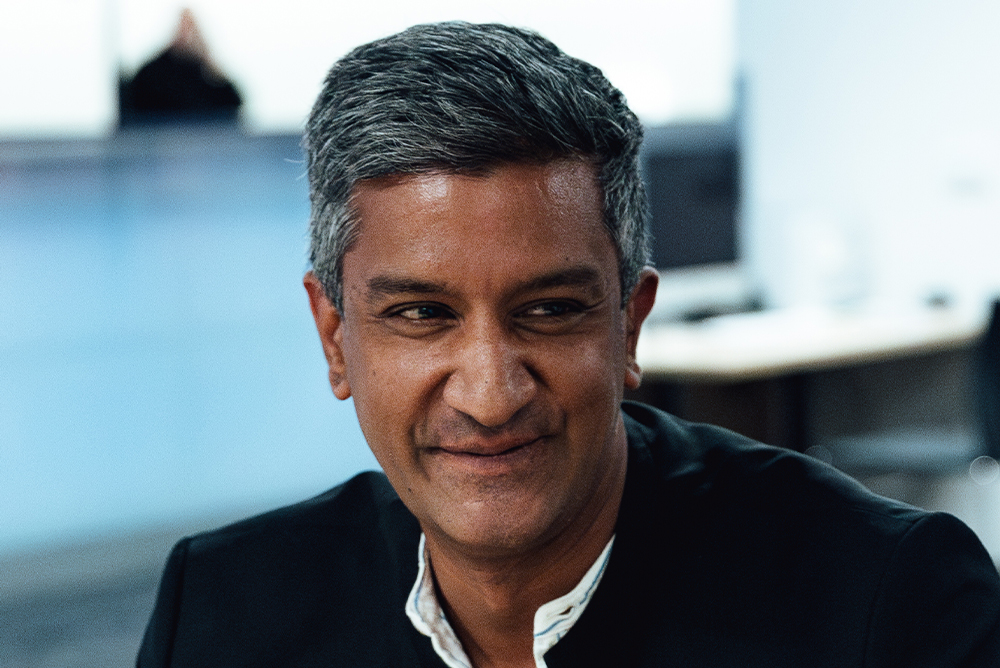
Photo by Chad Brady.
Ramesh Srinivasan has been a professor at UCLA since 2005. He is the founder of the university-wide Digital Cultures Lab, which explores the meaning of technology. Before moderating the Zócalo event “What Is the State of Surveillance?”—presented in partnership with ACLU of Southern California and The Progress Network—he sat down in our green room to talk about brahmaviharas, vinyl, and his dog Viva.
What’s your favorite food?
I like seafood coconut curries doused with ginger, chili, cumin, turmeric, and mustard seed.
Who makes the best one?
No one here in L.A. Not even close. Maybe the south Indian coast. But I was just in Kenya, and I ate the most incredible Indian food there.
You collect vinyl. What are some of your most prized records?
I have a bunch of really classical punk records. I have an old Sun Ra record that’s really good. I have a live Gang of Four record. I was a punk kid back in the day. Punk and hip-hop. I have a lot of old hip-hop, like, I have a couple of old records by KRS-One, the Roots…
You mentioned Sun Ra. How does music like that inspire your own work?
I’m really interested in how we might imagine life in a way that’s less built upon a kind of traumatizing critique and more built upon how those forms of trauma and critique can inform new possibilities. I tend to be interested in futurism of all forms that are inspired from the heart and the spirit. I look at technology in a similar way. Technology should be seen as that which we craft and create in our own image based on who we are. The question is, who the we is, and what are those values? There’s a lot of power in critique, but if the critique gets too hardened, it actually disables action and creativity.
What keeps you rooted in day-to-day life?
I’m a practicing Buddhist. It’s changed my life. I sit every morning, and I try to sit in the evening for at least 45 minutes and practice what are called the brahmaviharas, which are the four divine abodes that are discussed by Buddha. One is metta, which is being friendly. Another is karuna, which is compassion—wishing for others not to suffer; so it’s a little sweeter. If you sit with these energies in silence, you can feel the difference between them. The third is joy, mudita, it’s an empathic, compassionate joy. Sometimes it’s easy to forget these things. For me, continuous practice means I remember it more on a somatic level. And then the fourth practice is upekkha, which is being able to let go of things. Being able to let go is a very deep spiritual practice. So those four things in combination creates sort of a Petri dish that brings a lot of joy combined with peace and balance in my life.
What’s your favorite technology?
I’d argue that a certain type of what we might call progressive spirituality is a technology. Heidegger argued that techne, the root of technology, is an expression not merely of the rational mind, but also the poetic and aesthetic mind. He was influenced by Buddhist monks. Right now, our entire definition and understanding of technologies has been completely colonized by hype machines, whether it’s Clubhouse or ChatGPT.
You studied industrial engineering at Stanford. What was your favorite class you took there?
I have never been a typical engineer. I was studying art and philosophy and religious studies and music and stuff. I took this class on modernism and the avant-garde that was a lot about Dada. It was pretty punk, actually, like, Dada’s kind of punk. I also took a couple of courses on old Chinese religious studies, like Taoism. And I had a really good multivariate calculus class that I liked a lot too.
What’s the last thing that made you joyful?
My amazing dog, who I haven’t seen for the most part in the last few months. Her name is Viva. I met her in a village in the province of Oaxaca in Mexico; she was a little puppy. She’s been up with my friend who has a bookstore in Mendocino County. And just seeing her excitement at being back home with me, and her baller bed [a Casper mattress] that she has here that she didn’t have up there.



